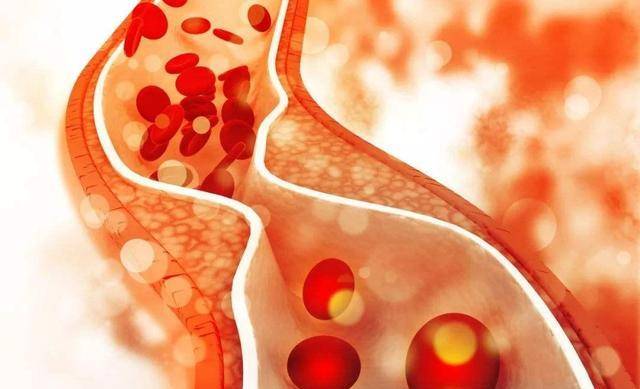The human body is filled with numerous blood vessels, each able to provide nutrients to the body. If the speed of blood circulation decreases and the blood clotting ability increases, it can easily lead to the appearance of thrombus issues.
With age, blood vessels also undergo aging and hardening, and the blood concentration increases, making it easier for blockages to occur, leading to cardiovascular diseases.
Four reasons for thrombus formation:
1. Elevated blood sugar and blood pressure
As the saying goes, many diseases originate from improper diet, which increases the burden on the body’s internal organs, leading to diseases, including thrombosis.
In diet, it is essential to control sugar, cholesterol, and fat intake to prevent high blood sugar and high blood pressure. Maintaining clean blood vessel surfaces and preventing sediment in the blood helps maintain proper blood flow and clotting function, effectively preventing thrombus formation.
2. Endothelial cell damage in the cardiovascular system
Endothelial cell damage is the most important and common cause of thrombus formation, often seen in rheumatic and infectious endocarditis, severe atherosclerotic plaque ulceration, and traumatic or inflammatory vascular injury sites.
In addition, extensive endothelial damage caused by factors such as hypoxia, shock, sepsis, and bacterial endotoxins activates the clotting process under the endothelium, leading to disseminated intravascular coagulation and thrombus formation in the systemic microcirculation.
3. Heavy smoking
Extensive smoking significantly increases the likelihood of thrombosis. Smoking itself is a risk factor for diseases, accelerating vascular disease and aging due to harmful substances that increase blood viscosity, potentially leading to thrombus formation.
Therefore, avoiding smoking behavior and staying away from tobacco are essential to maintain good health.
4. Overwork
If individuals overwork in their daily lives or neglect rest due to work, it can easily lead to fluctuations in blood pressure, causing changes in hemodynamics. Severe cases may lead to cerebral thrombosis.
Vascular blockages can easily trigger three diseases:
1. Myocardial infarction
Myocardial infarction is a condition caused by coronary artery blockages, with symptoms such as chest tightness and pain, mostly due to coronary artery blockages.
These arteries are responsible for supplying blood to the heart. When they become blocked or narrowed, blood delivery is affected, leading to chest pain.
2. Hyperlipidemia
High cholesterol levels may result from excessive fat intake, abnormal protein synthesis, or metabolic processes, causing blood vessel blockages due to increased blood viscosity. Vascular blockages may be associated with hyperlipidemia.
3. Renal diseases
If vascular blockages occur in the kidneys, renal artery stenosis, renal ischemia, and hypoxia may lead to hypertension or renal glomerular necrosis, potentially causing malignant hypertension.
When renal ischemia and hypoxia occur, renal function declines, leading to increased nocturnal urination. If blood clots form in the renal arteries, severe pain in the lower back and blood in the urine may occur.
A “cleansing machine” for blood vessels has been revealed – not kelp. It is advisable to eat openly and keep cerebral infarction away from you.
1. Chicken liver
Although chicken liver is delicious and high in iron content, which can prevent iron-deficiency anemia, frequent consumption can elevate cholesterol and blood lipid levels, leading to blood vessel blockages. Therefore, it is recommended to consume less chicken liver.
2. Onion
Onions contain a substance, prostaglandin A, which can dilate blood vessels, reducing vascular pressure and regulating blood density, promoting better blood flow. Onions also contain substances that activate fibrinogen in the body, preventing arterial hardening.
3. Garlic
Garlic, known as a “health protector,” has significant health benefits. Regular consumption can regulate blood lipid levels. Allicin in garlic can expand blood vessels, enhance vascular elasticity, maintain normal blood flow, prevent blood coagulation, and prevent vascular blockages.
4. Asparagus
Asparagus, rich in selenium and flavonoids, can effectively resist tumors and cancer cells. It reduces free radicals, inhibits cancer cell activity, preventing high blood fat and cardiovascular diseases, softening blood vessels, maintaining vascular patency, and reducing the occurrence of vascular diseases.
Review of 5 “clever methods” in life to maintain blood vessels, recommended for early adoption.
1. Regular exercise
For effective blood vessel maintenance, regular exercise is essential. Lack of physical activity is a key factor in vascular blockage and narrowing. Consistent exercise can dilate blood vessels, promote blood circulation, and help control blood lipids and pressure.
To maintain vascular health, adopting good lifestyle habits is crucial to promoting health, preventing vascular damage.
2. Avoid excessive labor
Neglecting rest, working late, and disrupting the circadian rhythm can lead to hormonal imbalances and adversely affect blood circulation. Toxic substances accumulate in the bloodstream, increasing blood viscosity and slowing down blood flow, causing vascular blockages.
3. Shoulder shrugs
After loosening the neck, move on to shoulder exercises. Lift both shoulders up, then slowly relax them. Repeat this for 5 minutes, several times a day, to prevent shoulder periarthritis and provide the driving force for blood flow from the neck arteries to the brain, accelerating blood flow to avoid stroke risks and reduce the potential for inadequate cerebral blood supply.
4. Running in place
If busy schedules leave no time for exercise, take a minute for some in-place running. Relax the body, gently raise the toes, and jog in place, making sure to engage the abdominal muscles. This accelerates blood circulation, supplying more blood to the body, reducing the risk of myocardial infarction.
5. Folic acid supplementation
Many may associate folic acid with pregnancy and fertility, but it is effective in reducing the incidence of coronary heart disease and stroke. Various foods rich in folic acid, such as spinach, apples, and asparagus, can lower the risk of coronary heart disease.


